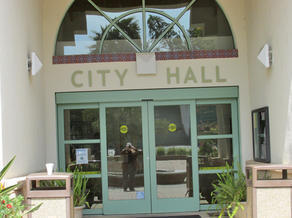At the end of a nearly two-hour discussion, the Avalon City Council directed staff to bring back a draft ordinance to regulate marijuana at the end of Monday’s study session on the issue.
Now that voters have legalized adult recreational marijuana use California cities have until January to decide whether to allow marijuana and, if so, how to regulate it locally. Monday was the council’s second study session on the subject.
At the end of a nearly two-hour discussion, the Avalon City Council directed staff to bring back a draft ordinance to regulate marijuana at the end of Monday’s study session on the issue.
Now that voters have legalized adult recreational marijuana use California cities have until January to decide whether to allow marijuana and, if so, how to regulate it locally. Monday was the council’s second study session on the subject.
According to Marc Tran, of the law firm Best, Best & Krieger, the city’s options are to do nothing, allow all uses, allow some uses or prohibit most uses. Best, Best & Krieger provides legal services to Avalon and other cities.
The council members appeared to agree that there should be no storefront commercial marijuana dispensaries in town. However, the council appeared undecided about whether to allow individuals to grow their own marijuana indoors or outdoors. State law allows six plants per residence for personal cultivation.
City Manager Dave Jinkens pointed out that there might be fire code issues with allowing residential cultivation. Jinkens also said there might be some building code issues.
One woman urged the council to fight having marijuana in the city. Pam Albers expressed concern that the city was making matters too complicated and proposed waiting until other communities see how legalized marijuana is working for them.
Michelle said she wanted to be the conservative voice. “Yes, we want it regulated,” she said.
“Parents all over the city are not in favor of it,” she said.
Councilman Joe Sampson said, “It’s banned here and it’s already normal; commonplace.”
He was apparently referring to current city law, which bans medical marijuana. The Avalon ordinance became law before California voters legalized recreational marijuana.
“The more we accept it and normalize it, the more we chip away and destroy the city,” Michelle said.
Rhonda Kalish of CHOICES expressed concern that enforcing codes regulating marijuana would effect other law enforcement services.
Kalish said there was an incident that hadn’t been reported to police in which a home was broken into by someone trying to steal a resident’s marijuana.
Jinkens said once it is legal, people would have access to the protections of the law.
In response to concerns that the council was proposing intrusive rules to regulate home grown marijuana, Councilwoman Cinde MacGugan-Cassidy pointed out that there had been an explosion in one residence.
Albers, a former Avalon city attorney, was among those residents who were concerned that the council was discussing overly complex regulations for home cultivation.
She also predicted litigation over what “reasonable regulation” would mean, given what she described as an attorney who was not familiar with how marijuana was grown.
“It is time to dial it back to assess what is being permitted by the people of the state of California and what the proper role of the city is to play,” Albers said.
“The thing you have to do is make sure that your ordinance comports with state law, which it doesn’t because you prohibit cultivation; you prohibit personal use,” Albers said. “That’s not consistent with the law—and if you’re worried about the state granting licenses to people come January 1st, then add a line that says we do not permit commercial cannabis activities in the city of Avalon.”
Capt. John Hocking, commander of the Avalon Sheriff’s Station, recommended having some kind of regulations to allow residents to grow marijuana safely in their homes and prohibit dispensaries on “Front Street.” (That’s the local nickname for Crescent Avenue.)
Hocking said he believed most people would cultivate marijuana rather than buy it on the street. He said he had worked in a city with an illegal marijuana dispensary. It was robbed of its cash.
“We had somebody drive a car through the front of the business to get the marijuana,” Hocking said.
Mayor Anni Marshall wanted to know what would happen if the council approved an ordinance, but it lacked the “fine tuning” it required.
City Attorney Scott Campbell said one or two cities had decided to ban marijuana until they have studied the issue.
A young man named Carl said he is a medical marijuana patient. He said he was one of 109 such patients locally. He said not all of them have a green thumb and suggested there would be a need for someone to provide marijuana.
He said he was not in favor of combining cigarettes and marijuana in the city’s smoking ordinance. He opposed allowing people to smoke pot on the street.
Carl also opposed storefront marijuana businesses. He said it would be delivery only.
Campbell said the council could enact an ordinance to allow marijuana that would not go into effect until regulations were developed. Mayor Anni Marshall said she didn’t think that a lot of people would be growing marijuana. She also opposed allowing public marijuana smoking.











